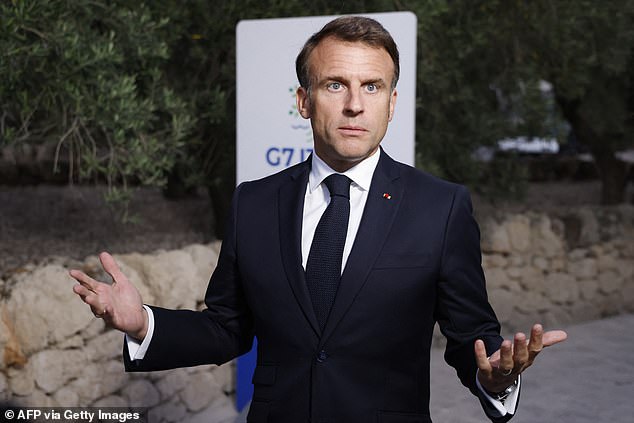ALEX BRUMMER: Liz Truss market chaos will be nothing if Marine Le Pen’s National Rally wins French parliamentary elections
Sipping champagne at the Elysee Palace has become a May rite for the princes of high finance. Among European leaders, President Emmanuel Macron, a former Rothschild banker, has pushed hardest for Paris to supplant the City of London as the continent’s financial center in the post-Brexit era.
The good food and drink is backed by sweeping regulatory reforms designed to showcase France’s winning ways as a financial centre.
The annual “Choose France” summits have achieved notable triumphs. Morgan Stanley has tripled the number of employees in Paris to 450 and foreign banks, including First Abu Dhabi and Nigeria’s Zenith Bank, have opened new branches amid much fanfare.
Bond markets are starting to price in the prospect of Marine Le Pen’s National Rally winning the parliamentary elections in two rounds on June 30 and July 7.

Emmanuel Macron, a former Rothschild banker, has pushed hardest for Paris to supplant the City of London as the continent’s financial center in the post-Brexit era
But Macron’s offensive appears to be in danger. Liz Truss may have fatally undermined confidence in Tory economic competence. But her chaos on global markets will amount to nothing if Marine Le Pen’s National Rally (RN) wins the two-round parliamentary elections on June 30 and July 7.
It may be too early for the city, which has maintained its lead in most financial areas, to declare victory over its would-be rival. But if there were a French word for schadenfreude, you couldn’t blame the residents of the Square Mile for enjoying the moment.
Bond markets are starting to price in the prospect of a far-right victory, undermining Macron’s ability to govern from the center.
Imagine how markets would react to the choice of Jordan Bardella, a 28-year-old unknown, as prime minister with plans to cut taxes, rebel against Europe’s costly climate change agenda and declare war on immigration. All this would be alarming enough if France were not already a budget problem.
Amid temporary triumphs, such as the sight of the value of shares on the Paris Stock Exchange overtaking those on the London Stock Exchange (now reversed), little attention has been paid to the soft underbelly of Macron’s rule.
Whoever dominates policymaking after the election and in the run-up to the next presidential election in 2027 (when Macron cannot hold his ground) will face a bloated budget deficit and debt levels that no British government of any political stripe can match. can tolerate. , would look at. No doubt Paris will put on an elegant show for the Olympics. Even the shabby Champs-Elysees is getting a facelift with a new LVMH emporium. But a budgetary horror show could still spoil the party. Last year the budget deficit was £147 billion – more than 5 percent of national output. France has one of the highest debt burdens in Europe, with £2.1 trillion or 111 percent of output (much larger than Britain, which the Office for Budget Responsibility says will peak at 93 in 2028-2029, 2 percent).
The yield on French government bonds has risen to 3.1 percent, the highest level since 2012. The gap with German bonds – the gold standard in the euro zone – has increased to 0.7 percent.
The market fears that if Le Pen gains a majority, the ratio of loans to production will certainly increase. Any hopes of reaching the 4.5 percent target by 2027 would evaporate. Even before the RN threat came into view, the IMF warned that the Macron government’s economic assumptions would be “somewhat optimistic.”
France is an important trading partner for Britain and its cooperation on immigration will be crucial for the next British government. It is not in our national interest to see French politics in turmoil and the economy buried under a flood of public and private debt.
Yet it is difficult to feel sympathy for a country that wanted to make the economic and financial life of ‘la perfide Albion’ as difficult as possible after Britain had the audacity to leave the EU.
